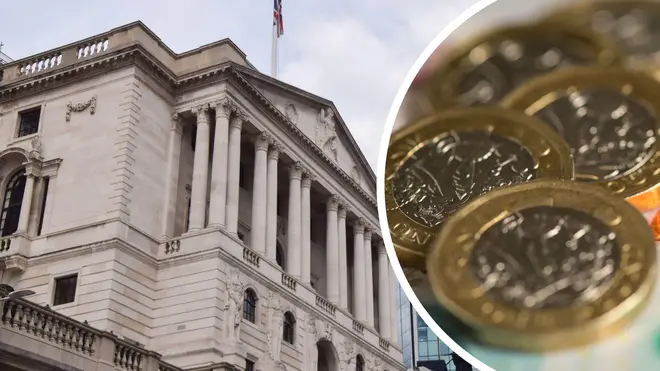
Matthew Wright 7am - 10am
4 August 2022, 19:45 | Updated: 3 November 2022, 10:54

The Bank of England said that it would hike interest rates by 0.5 percentage points to 1.75 per cent on Thursday.
It is the largest single hike for 27 years - and the highest that interest rates have reached since January 2009.
But what does the rate hike actually mean for households? And does anyone stand to gain?
The Bank of England is tasked with keeping inflation - a general increase in the prices of things - under control, targeting 2 per cent a year.
But in recent months inflation has started to run away. It hit 9.4 per cent in June and is expected to spike to 13.3 per cent in October, according to a new forecast from the Bank.
Read more: Brits to face energy bill rises every three months as Ofgem changes price cap updates
In response, the Bank can increase interest rates. That makes it more expensive to borrow money, so people are likely to spend less.
In theory, if people - and businesses - are forced to spend less, demand will decrease and prices will fall as a result.

Lack of action on cost of living 'government-led euthanasia programme'
The most obvious impact is that it will become more expensive for people to pay off their mortgages.
People taking out a new loan will soon be quoted a higher interest rate as a result of the Bank's change.
And those whose mortgages are being renegotiated will likely have to deal with larger bills than they had in the past.
Trade association UK Finance said that the rate rise would likely cost the average person with a tracker mortgage around £600 a year.
Read more: Cost of living crisis: Britain warned 15% inflation 'plausible' scenario next year
Read more: Petrol companies ‘keeping prices high despite falling wholesale costs’, warns RAC
Inflation is a measure of how much the price of the things that the average household buys is changing.
It is likely to peak in October, largely due to one thing: the amount that people pay for the energy they use to run their homes.

Mortgage broker slams Govt for response to interest rate hike
Gas prices have soared, and energy bills in October are expected to be three times higher than they were a year earlier.
Energy prices will contribute half of the inflation that the Bank is expecting.
Watch: 'Disgusted' caller blasts 'idiotic' Govt for inaction over 'obscene' energy price hike
Savers will benefit a little from the rate hike as they will get more interest on money in their accounts.
However, less than a third of the interest rate hikes since November, when the Bank started increasing rates, have actually made its way to savers.
The impact of the increased interest that savers get will also be more than offset by inflation, which is more than decimating savings.